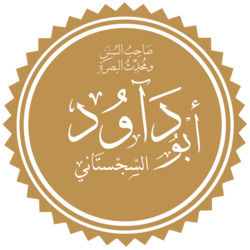Religion:Abu Dawood
Sulaymān ibn al-Ash‘ath ibn Isḥāq al-Azdī, Abū Dā’ūd al-Sijistānī | |
|---|---|
 Abu Dawud's name in the style of Arabic calligraphy | |
| Personal | |
| Born | 817–18 CE / 202 AH |
| Died | 889 CE / 275 AH |
| Religion | Islam |
| Nationality | Abbasidi |
| Ethnicity | Arab |
| Era | Islamic golden age |
| Denomination | Sunni Islam |
| School | Hanbali |
| Creed | Hanbali |
| Main interest(s) | ḥadīth and fiqh |
| Notable work(s) | Sunan Abī Dāwūd |
| Occupation | muhaddith |
| Muslim leader | |
Influenced by
| |
Influenced
| |
Abū Dā’ūd Sulaymān ibn al-Ash‘ath ibn Isḥāq al-Azdī al-Sijistānī Arabic: أبو داود سليمان بن الأشعث الأزدي السجستاني), commonly known simply as Abu Dawud, was a Arab[2] scholar of prophetic hadith who compiled the third of the six "canonical" hadith collections recognized by Sunni Muslims, the Sunan Abu Dāwūd.
Student of Imam Ahmad Ibn Hanbal.
Biography
Abū Dā’ūd was born in Sijistān and died in 889 in Basra, Iraq. He traveled widely collecting ḥadīth (traditions) from scholars in Iraq, Egypt, Syria, Hijaz, Tihamah, Nishapur, and Merv among other places. His focus on legal ḥadīth arose from a particular interest in fiqh (law). His collection included 4,800 ḥadīth, selected from some 500,000. His son, Abū Bakr ‘Abd Allāh ibn Abī Dā’ūd (d. 928/929), was a well known ḥāfiẓ and author of Kitāb al-Masābīh, whose famous pupil was Abū 'Abd Allāh al-Marzubānī.[3][4]
School of thought and Quotes
Imam Abu Dawud was a follower of Hanbali although some have consider him Shafi.[5]
Imam Abu Dawud himself has stated: "From this book of mine four (4) Hadith are sufficient for an intelligent and insightful person.[6] They are:
- Deeds are to be judged only by intentions.[7]
- Part of a man's good observance of Islam is that he leaves alone that which does not concern him.
- None of you can be a believer unless you love for your brother that which you love for yourself.
- The permitted (halal) is clear, and the forbidden (haram) is clear, between these two are doubtful matters. Whosoever abstains from these doubtful matters has saved his religion."
Works
Principal among his twenty-one works:
- Sunan Abu Dāwūd; contains 4,800 hadith – mostly sahih (authenticated), some marked ḍaʿīf (unauthenticated) – usually numbered after the edition of Muhammad Muhyi al-Din `Abd al-Hamid (Cairo: Matba`at Mustafa Muhammad, 1354/1935), where 5,274 are distinguished. Islamic scholar Ibn Hajar al-Asqalani), and some others, believe a number of the unmarked hadith are ḍaʿīf.
- Kitab al-Marāsīl, lists 600 extensively investigated sahih mursal hadith.
- Risālat Abu Dāwūd ilā Ahli Makkah; letter to the people of Makkah describing his Sunan Abu Dāwūd.[8]
- Kitāb al-Masāhif, catalogs non-Uthmanic variants of the Qur'an text
Early Islam scholars
See also
- Kutub al-Sittah
- Sunan Abu Dawood
Notes
References
- ↑ Al-Bastawī, ʻAbd al-ʻAlīm ʻAbd al-ʻAẓīm (1990). Al-Imām al-Jūzajānī wa-manhajuhu fi al-jarḥ wa-al-taʻdīl. Maktabat Dār al-Ṭaḥāwī. p. 9.
- ↑ Frye, R. N.; Fisher, William Bayne; Frye, Richard Nelson; Avery, Peter; Boyle, John Andrew; Gershevitch, Ilya; Jackson, Peter (1975-06-26) (in en). The Cambridge History of Iran. Cambridge University Press. ISBN 978-0-521-20093-6. https://books.google.nl/books?id=hvx9jq_2L3EC&printsec=frontcover&dq=history+iran+volume+4+cambridge&hl=en&sa=X&ved=2ahUKEwiBrfPktNfqAhULy6QKHZ7MDrAQ6AEwAHoECAAQAg.
- ↑ Nadīm (al-) 1970, pp. 164-6.
- ↑ Khallikān (Ibn) 1843, p. 590, I.
- ↑ http://www.islamicencyclopedia.org/islamic-pedia-topic.php?id=54
- ↑ "Imam Abu Dawud". http://www.sunnah.org/history/Scholars/imam_abu_dawud.htm.
- ↑ Shahih Al Bukhari, Imam Al Bukthari, Vol.1 Book 1 Hadith 1
- ↑ Translation of the Risālah by Abū Dāwūd
Bibliography
- Baghdādī (al-), Al-Khaṭīb Abū Bakr Aḥmad ibn ‘Alī (2001) (in Arabic). Ta’rīkh Madīnat al-Salām (Ta’rīkh Baghdād). X, §4591. Beirut: Dār al-Gharib al-Islāmī. p. 75. https://ia800500.us.archive.org/1/items/WAQtaba/taba10.pdf.
- Khallikān (Ibn), Aḥmad ibn Muḥammad (1843). Wafayāt al-A’yān wa-Anbā’ Abnā’ al-Zamān (The Obituaries of Eminent Men}. I. Paris: Oriental Translation Fund of Great Britain and Ireland. pp. 590-91. https://archive.org/stream/WafayatAlAyantheObituariesOfEminentMenByIbnKhallikan/Vol1Of4WafayatAl-ayantheObituariesOfEminentMenByIbnKhallikan#page/n629/mode/2up.
- Nadīm (al), Abū al-Faraj Muḥammad ibn Isḥāq Abū Ya’qūb al-Warrāq (1970). Dodge, Bayard. ed. The Fihrist of al-Nadim; a tenth-century survey of Muslim culture. New York & London: Columbia University Press. https://archive.org/details/fihristofalnadim0000ibna.
- Nawawī (al-), Abū Zakarīyā’ Yaḥyā (1847). Wüstenfeld, Ferdinand. ed (in Arabic). Kitāb Tahdhīb al-Asmā’ (Biographical Dictionary of Illustrious Men). Göttingen: London Society for the Publication of the Oriental Texts. p. 708 Arabic. https://archive.org/details/b30092966/page/n175.
External Links
- Biodata at MuslimScholars.info * Biography at Sunnah.com
- Letter from Imam Abu Dawud to the people of Makkah explaining his book, terms he uses, and his methodology.

